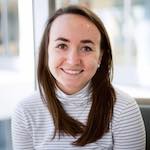Graduate Student Success- Education
Stories from Education Graduates and Alumni
Do you have a success to share with Marquette University's Graduate School? We'd love to hear from you. Tell us about your new job, presentation, publication, or any other award or honor you've recently received. We will post your story here and on the Marquette University Facebook and Twitter pages.
I WANT TO SHARE MY SUCCESS STORY
Maddie Hahn- College of Education, Educational Policy and Leadership
 Maddie Hahn has been awarded the Berry Fellowship at the Wisconsin Policy Forum for the 2020-2021 academic year. Working under the guidance of senior researchers at the Forum, her research will focus on the English Learner (EL) academic achievement gap in Wisconsin. Specifically, she will be conducting a comparative analysis of EL achievement based on their enrollment in schools that offer distinct bilingual-bicultural programs. Throughout the application process, Maddie sought out advice and insight from various EDPL faculty, and she thanks them all for their support and guidance.
Maddie Hahn has been awarded the Berry Fellowship at the Wisconsin Policy Forum for the 2020-2021 academic year. Working under the guidance of senior researchers at the Forum, her research will focus on the English Learner (EL) academic achievement gap in Wisconsin. Specifically, she will be conducting a comparative analysis of EL achievement based on their enrollment in schools that offer distinct bilingual-bicultural programs. Throughout the application process, Maddie sought out advice and insight from various EDPL faculty, and she thanks them all for their support and guidance.
 Jennifer Gaul-Stout- PhD, Educational Policy and Leadership
Jennifer Gaul-Stout- PhD, Educational Policy and Leadership
In her 4th year, Jennifer presented her paper at the National Association for Research in Science Teaching in Atlanta, Georgia. Her presentation, How Activist are Made: Understanding Activism and Scientific Literacy represents a cross case analysis of two communities where very different industrial movements have threatened health and quality of life in local communities. She discovered that the process of engaging in defending one’s community in the face of socio-economic controversy was similar across both cases. Together these two case studies lend important insight into the enactment and development of scientific literacy in contexts of socio-scientific activism. Examining the enactment of scientific literacy in two contexts where science takes center stage in social and political controversy promises to contribute evidence and nuance surrounding widely held suppositions about contributions of scientific literacy to enhancing citizens’ personal and political lives. Further, noting the characteristics of scientific literacy as it is enacted in contexts of socio-scientific controversy provides insight into how school and informal science might contribute to more effectively preparing citizens to engage scientific issues in the public sphere.
Jennifer will go on to present two papers at the Urban Affairs Association Conference in Toronto, ON.




 Maddie Hahn has been awarded the Berry Fellowship at the Wisconsin Policy Forum for the 2020-2021 academic year. Working under the guidance of senior researchers at the Forum, her research will focus on the English Learner (EL) academic achievement gap in Wisconsin. Specifically, she will be conducting a comparative analysis of EL achievement based on their enrollment in schools that offer distinct bilingual-bicultural programs. Throughout the application process, Maddie sought out advice and insight from various EDPL faculty, and she thanks them all for their support and guidance.
Maddie Hahn has been awarded the Berry Fellowship at the Wisconsin Policy Forum for the 2020-2021 academic year. Working under the guidance of senior researchers at the Forum, her research will focus on the English Learner (EL) academic achievement gap in Wisconsin. Specifically, she will be conducting a comparative analysis of EL achievement based on their enrollment in schools that offer distinct bilingual-bicultural programs. Throughout the application process, Maddie sought out advice and insight from various EDPL faculty, and she thanks them all for their support and guidance. Jennifer Gaul-Stout- PhD, Educational Policy and Leadership
Jennifer Gaul-Stout- PhD, Educational Policy and Leadership 